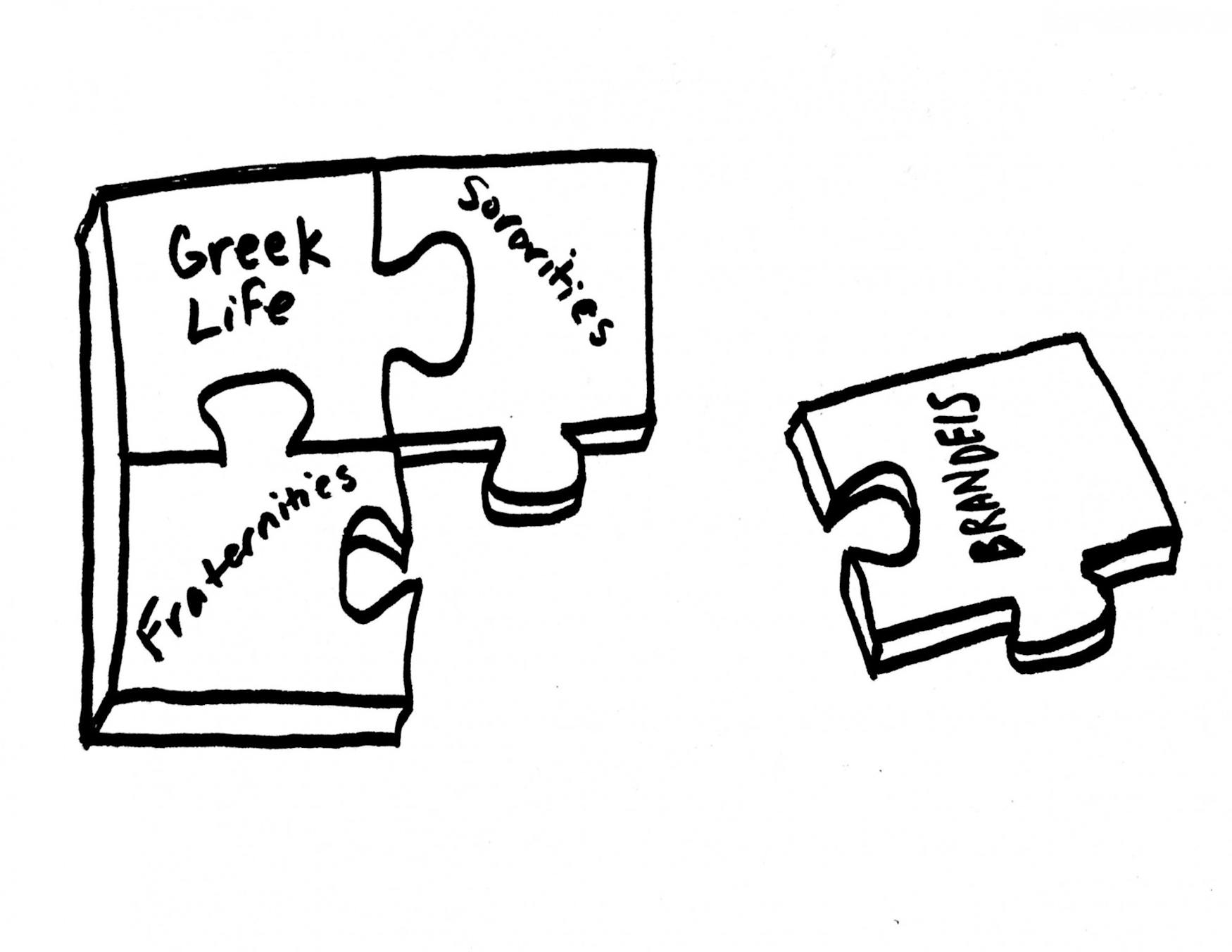Recognizing Greek life would solve a lot of its problems
This past week, several Brandeis Greek life organizations participated in an event aimed at raising awareness of sexual assault on campus, titled These Letters Believe Survivors. Each day of the week, two organizations — a fraternity and a sorority — set up a table in Upper Usdan with petitions to support legislation that would ensure that resources, like the Prevention, Advocacy & Resource Center at Brandeis, are present in all Massachusetts universities. There was also an option for passersby to write a direct letter to Massachusetts representatives stating their support for this bill. Sexual assault is an epidemic, especially on college campuses, and it would be absolutely nescient to think that Brandeis is excluded from this conversation. This effort, which was organized entirely by members of Greek life themselves, was an effective way to raise awareness and to get people directly involved in the fight for prevention. However, efforts by members of Greek life to actively prevent sexual assault leave much to be desired.
Full disclosure: I am a member of a sorority on campus, and I am not here to shame any person or organization. Brandeis Greek organizations have a strong “we’re all in this together” mentality, and I do not intend to break that. I am writing to share my experiences and thoughts as someone whose Brandeis experience is closely tied to a Greek life organization. I love my sorority and each and every member in it, and I could go on and on about why being a part of it has been beneficial to me. I’m here to make the greater Brandeis community aware of Greek life on campus, as many people who are not a part of an organization do not have as much information about them.
Greek life is not recognized by the University administration. However, the Greek Awareness Council often acts as a liaison between organizations and the administration when it comes to booking rooms for meetings and other activities. GAC acts more as a Greek life UN than that of a panhellenic council at a larger school. Besides common sense, there are no overarching rules for organizations that are enforced outside of the recruitment, or “rush” period. This often means that numerous incidents get swept under the rug and are ignored. If Brandeis were to recognize Greek life, it is likely that some regulations would exist, and there would be repercussions for breaking them. As it stands right now, it is up to independant organizations to instill punishment if a member violates that organization’s policies.
As one could imagine, since there are no baseline rules, each organization can punish misdemeanors at their own discretion. Hypothetical situation: someone in an organization goes to a party and their drink is spiked by someone who is part of a different organization. It is entirely plausible that nothing would happen to the perpetrator even if the victim spoke out. GAC can’t really do anything, and the risk management team/executive board of the perpetrator’s organization could easily just shut down the accusation. Now, of course, we’d all like to think that this would never happen, but as it stands right now, it is likely that it could. These organizations could continue to maintain their relationship, and nothing would change. In reality, the only thing that stops organizations from fraternizing with each other is reputation, which is a large aspect of Greek life. Every organization has a reputation, whether it be positive, negative or neutral, which controls the majority of interactions between organizations. Some organizations have long-held relationships, and some don’t because of reputations. Frankly, I find it abhorrent that social life and reputation are among the few things controlling how Greek life functions.
When I got to college, I thought my days of high school drama were over. Yet, when I arrived at Brandeis, I found out this would not be the case. Brandeis is a very small school, and the effect of the dilemma of reputations in Greek life just exacerbates the situation. Relationships between organizations are very delicate, often to the point where one side can terminate it based off of pettiness. It is not infrequent for organizations to not even respond to other organizations’ requests for joint events due to the fact that they have some vendetta (usually trivial in nature) against the other organization, or one of its members. Relationships between the fraternities and sororities are especially fragile, since events involving both of them are the framework for social life within Greek life at Brandeis. As someone who also oversees social events, it is extremely frustrating when other organizations simply do not respond to messages because of whatever minor feud they imagine is going on. Communication is key for any environment, but for a community such as Greek life, where everyone is relying on each other heavily, being exclusive does nothing but harm. I strongly feel that if Greek life was recognized by the administration, there would be more control over the organizations’ relationships and these petty issues would not be happening.
The controversy of whether or not Greek life should be recognized by the administration is widely debated among many members of the Brandeis community; I firmly believe that it should be.
What Brandeis sororities and fraternities need is control, to ensure that the hypothetical I explained earlier does not happen. While efforts like These Letters Believe Survivors are definitely helpful, it is like putting a small band-aid on a large cracked window — it doesn’t really fix the greater problem. I think that if the Brandeis administration recognized Greek life, many problems within and between organizations would be solved, and the greater Brandeis community would benefit significantly. If not, events and members will continue to go unregulated, and there is no telling what could potentially happen. Your move, Brandeis.




Please note All comments are eligible for publication in The Justice.